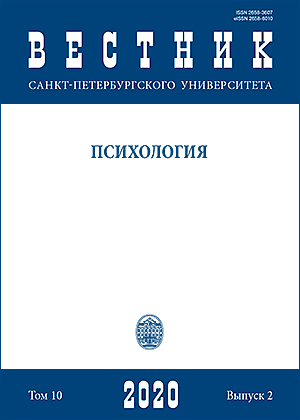Productive and unproductive patterns of metacognitive regulation of intellectual performance
DOI:
https://doi.org/10.21638/spbu16.2020.205Abstract
The increase of intellectual performance efficiency in students and adult professionals involved in intellectual work on a regular basis is a very topical issue in both science and practice. We investigated patterns of metacognitive regulation typically used by our subjects during their performance of intellectual work of various kinds. The objective of our research was to determine if the patterns we found in our previous study manifest themselves in another sample and whether or not they can be divided into 2 groups: productive and unproductive. The design of our study consisted of two stages: at the first stage of the study subjects (college and university students, n = 32, 17–25, 12 men) were asked to estimate how often different patterns of metacognitive regulation manifest themselves in their behavior; at the second stage another group of subjects (college and university students and graduates, n = 30, average age 33, 14 men) classified the same 40 patterns as either productive or unproductive. The following results were found: 1) for 39 out of 40 patterns at least half of the answers were one of the following: ‘rarely’, ‘sometimes’, ‘often’ and ‘always’; also for 37 out of 40 patterns the most frequent answer was one of the following: ‘rarely’, ‘sometimes’, ‘often’ and ‘always’; 2) disparity between our theoretical estimate of patterns’ productivity and empirical estimate of subjects was found for only 3 out of 40 patterns. From the results, the following conclusions were made: 1) all 40 patterns of metacognitive regulation of intellectual performance exist in different samples; 2) 37 out of 40 patterns can be divided into 2 groups: productive and unproductive.
Keywords:
intellectual performance, metacognitive regulation, intellectual productivity
Downloads
References
References
Downloads
Published
How to Cite
Issue
Section
License
Articles of "Vestnik of Saint Petersburg University. Psychology" are open access distributed under the terms of the License Agreement with Saint Petersburg State University, which permits to the authors unrestricted distribution and self-archiving free of charge.




